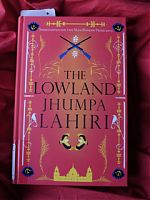
Jhumpa Lahiri
The Lowland
Sometimes I wonder what is it that drives me from one book to another. What am I seeking? I wonder this only when I get close to what I want. And then my reading stops, at least for a weekend. Jhumpa Lahiri’s The Lowland was that book, the book to quench my reading appetite, at least over a weekend.
It was strange, the left-over sensation of this book, which felt like a haunting—the memories of The Lowland lingered, the feelings it gave while reading couldn’t be shaken. In a way, these feelings reminded me of what I experienced when I read Where the Red Fern Grows when I was probably twelve. I read that book several times, and it haunted me. I don’t know what left The Lowland’s aftertaste, something uncomfortable, something difficult to shake, something to do with its tragedies.
There are so many levels of sadness and tragedy in The Lowland. Jhumpa Lahiri is the author I’ve read in my adult life who can get me crying just like I did when I read Where the Red Fern Grows. The whole book seems to embrace the following few clauses, said from Subhash’s point of view in the second to last chapter:
A marker, toward the end of his journey, of what is given, what is taken away.
And there it is: “what is given, what is taken away” work like alternating forces throughout The Lowland, sometimes overlapping, sometimes cause and effect.
But the book didn’t weigh me down. The heavy plot is expertly countered by Lahiri’s succinct, light prose. Like the quote above, The Lowland is littered with sentence fragments—a deliberate attempt on Lahiri’s part to trim off the weight (see this interview in The New Yorker). And I wonder if it wasn’t the lightness of the text holding up such a heavy story that sometimes made me uncomfortable. It’s an impressive feat. It means there’s an almost otherworldly strength within the prose—light and strong at the same time, a ghost lifting up a car.
Jhumpa Lahiri’s use of time also struck me dumb in certain places. Throughout the book she often uses only two sentences to pass years and give us a sense of the years passing and what occurred during them at the same time. Subhash’s lifetime is contained in the book, and most of Gauri’s and Bela’s. But The Lowland isn’t long at all, about 300 pages.
In a way, The Lowland is my perfect book. The quick turns of the page and the deep meaning within each word; a delicious, dramatic plot and wide, real characters. And maybe because it seems so perfect, one of my favorite sentences is one that breaks the rule of two metaphors instead of one (and yes, it breaks it perfectly):
From the terrace Bela watched the thin trunks of palm trees bending but not breaking in the maritime wind. The pointed foliage flapped like the feathers of giant birds, like battered windmills that churned the sky.
· · · · · · · · · · · · · · · · · · · ·